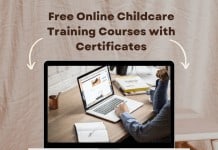Early Childhood Education courses in Nigeria talks about the given educational settings for children aged 3 through 5 years; in preparing their entry into primary school. This is the same in other countries that offers this program for instance, Canada.
In this article at World Scholars Hub, we will bring to you the top 5 schools offering early childhood education in Nigeria, as well as the courses involved in this program.
We will also share the subjects that requires to be aced in some Nigerian exams before you can get admitted into the university system, starting from JAMB.
Rounding this article up, we will share with you, the benefits of Early childhood education courses in Nigeria. So relax and grasp the information you need.
Please note that these number of schools listed here are not limited to just these, but there are a lot of schools that offer early childhood education courses in Nigeria.
Table of Contents
Top 5 Schools offering Early Childhood Education Courses in Nigeria
Early Childhood Education can be studied under the department of Education in the following Nigerian Universities:
1. University of Nigeria (UNN)
Location: Nsukka, Enugu
Founded: 1955
About University:
Established by Nnamdia Azikwe in the year, 1955 and formally opened on 7th October, 1960. The University of Nigeria is the first full-fledged indigenous and also first autonomous university in Nigeria, modelled upon the American educational system.
It is the first land-grant university in Africa and also one of the 5 most reputed universities in Nigeria. The university consists of 15 Faculties and 102 academic departments. It has a student population of 31,000.
The programme in Early Childhood Education fills the global gap for training of professionals for this level of education. This program has a lot of objectives, among these are; produce educators who can implement the national objectives of early childhood level of education, and train professionals who understand the basic characteristics of young children of early childhood education age.
Early Childhood Education Courses in University of Nigeria
The courses taught in this program in UNN are the following:
- History of Education
- Origin and Development of Early Childhood Education
- Introduction to Education
- Preschool Education in Traditional African Societies
- Early Childhood Education Curriculum 1
- Play and Learning Experience
- Environment and the Development of the Preschool Child
- Observations and Assessment of Young Children
- Developing Home and School Relationship
- Philosophy of Education and many more.
2. University of Ibadan (UI)
Location: Ibadan
Founded: 1963
About University:
The University of Ibadan (UI) is a public research university. It was originally called University College Ibadan, one of many colleges within the University of London. But in 1963, it became an independent university. It also became the oldest degree-awarding institution in the country. In addition, UI has a student population of 41,763.
Early Childhood Education in UI teaches students about the Nigerian child, and how to understand and communicate with them. Also, the application of technology in the child education is studied.
Early Childhood Education Courses in University of Ibadan
The courses taught in this program in UI are the following:
- History of Nigerian Education and Policy
- Principles and Methods of Historical and Philosophical Research methods
- Science and Technology in Early Childhood Education
- Children Literature
- Working with Children Additional Needs
- Early Childhood as Profession
- Integrated Early Childhood Education
- Working with families and Communities
- Comparative Education
- Early Childhood Education Projects in Nigeria and Other Countries
- Sociology of Education
- Early Childhood Education Teaching Methods III and many more.
3. Nnamdi Azikwe University (UNIZIK)
Location: Awka, Anambra
Founded: 1991
About University:
Nnamdi Azikiwe University, Awka also known as UNIZIK is a federal university in Nigeria. It is made up of two campuses in Anambra State, where its main campus is located in Awka (the capital of Anambra State) while the other campus is located at Nnewi. This school has a total population of about 34,000 students.
The early childhood education program focuses on the systematic method of observing and recording the growth and development of young children ages 2-11 in an early childhood care and educational settings-child care Centre, nursery and elementary schools.
Early Childhood Education Courses in Nnamdi Azikiwe University
The courses taught in this program in UNIZIK are the following:
- Research Methods
- Educational Psychology
- Education Technology
- Curriculum and Instruction
- Philosophy of Education
- Sociology of Education
- Micro Teaching 2
- Literacy Instruction in Preprimary and Primary Education
- Science in the Early years
- Mathematics Instruction in Preprimary and Primary Education 2
- The Nigerian Child 2
- Theory of Educational Development in Nigeria
- Measurement & Evaluation
- Educational Administration & Management
- Guidance & Counselling
- Introduction to Special Education
- Guiding Children’s Behaviour
- Management of ECCE Centre, and many more.
4. University of Jos (UNIJOS)
Location: Plateau, Jos
Founded: 1975
About University:
University of Jos also called, UNIJOS is a public university in Nigeria and it was coined out from the university of Ibadan. It has a student population of more than 41,000.
This program is involved in preparing teachers in various programmes in Arts & Social Sciences Education, Science and Technology Education and Special Education at the diploma, undergraduate and post-graduate levels.
Early Childhood Education Courses in University of Jos
The courses taught in this program in UNIJOS are the following:
- Ethics and Standards in ECE
- Observation and Assessment in ECPE
- Statistical Methods in Educational Research
- Research Methods
- Educational Psychology
- Education Technology
- Curriculum and Instruction
- Philosophy of Education
- Sociology of Education
- Micro Teaching
- Teaching Methods in Primary Education
- Child Growth and Development
- Literacy Instruction in Preprimary and Primary Education
- Science in the Early years and many more.
5. National Open University of Nigeria (NOUN)
Location: Lagos
Founded: 2002
About University:
The National Open University of Nigeria is a Federal Open and Distance Learning institution, the first of its kind in the West African sub-region. It is Nigeria’s largest tertiary institution in terms of student number with a student body of 515,000.
Early Childhood Education Courses in National Open University of Nigeria
The courses taught in this program in NOUN are the following:
- Software Application Skills
- Structure of Modern English I
- Professionalism In Teaching
- History Of Education
- Introduction To Foundations Of Education
- Child Development
- Basic Research Methods In Education
- Introduction To Philosophy Of Early Childhood Education
- Health Care In The Early Years
- Primary English Curriculum And Methods
- Primary Mathematics Curriculum Methods
- Educational Technology
- Comparative Education
- Teaching Practice Evaluation & Feedback
- Origin And Development Of E.C.E
- Development Of Appropriate Skills In Children
- Guidance And Counselling 2
- Introduction To Social Studies
- Plays And Learning and many more.
Subject Requirements needed to Study Early Childhood Education in Nigeria
In this session, we will list out the subject requirements based on the exams which the student would need to write and get a good score before getting admission to the university of their choice. We will begin with JAMB UTME and proceed to others.
Subject Requirements for JAMB UTME
In this exam, the English Language is compulsory for this course. There are three other subject combination needed to study Early Childhood Education under the Faculty of Education in the above Universities. These subjects include any three subjects from the Arts, Social Sciences, and Pure sciences.
Subject Requirements for O’Level
The O’level subject combination and requirements needed to study Early Childhood Education are; five ‘O’ Level credit passes including English Language.
Subject Requirements for Direct Entry
These are the requirements you need to fulfill to gain Direct Entry admission to study Early Childhood Education, that is if you don’t intend to use UTME. The student will require; two ‘A’ Level passes chosen from relevant subjects. These relevant subjects could be Primary Science, Health Science, Biology, English, Mathematics, Physics and Integrated Science.
Benefits of Early Childhood Education Courses in Nigeria
1. It improves Social Skills
You should know that, young children love to play and communicate with their mates, and the preschool environment gives them the opportunity to do just that.
Besides, the environment enables children to acquire crucial skills that will allow them to listen to one another, express ideas, make friends, and collaborate.
One major advantage of social skills in early childhood education in Nigeria is the fact that it plays a major role in facilitating a student’s achievement in reading and mathematics by directly influencing motivation, which in turn affects engagement.
2. It creates Eagerness to Learn
There might be a little disagreement with this point, but it is a statement of fact. Students who receive quality early childhood education in Nigeria are reportedly more confident and also inquisitive, which causes them to perform better in grade school.
Teaching young Nigerian kids early childhood education helps them to learn how to manage challenges and build resilience in times of difficulty. You will find that students who begin schooling from the preschool settle easily at the institution and they acquire a long-term interest in learning different things, including music, drama, singing and so on.
3. It encourages Holistic Development
Teaching early childhood education in Nigeria to young children provides a strong basics for their development. It helps to build the child’s cognitive, physical, social and emotional proficiency which will prepare them for the challenges of life.
4. Boost Self-Confidence
Through the interactions with other children and teachers, kids develop a positive mindset and perception of themselves. A child at three years, when compared to other children who might be older, will surely display a level of boldness and articulation — this is as a result of teaching early childhood education.
5. It enhances Attention Span
It is no new thing to know that, young children always find it difficult to pay attention in the classroom, especially from age 3 to 5 years. The time length during which preschool children concentrates has always been a concern for educators and teachers.
Nevertheless, if the young children are taught early childhood education in Nigeria at a tender age, this will help increase their attention span.
Also, motor skills are very crucial to young children — some tasks such as painting, drawing, playing with toys can go a long way in improving their attention.
In conclusion, there are so many other benefits of early childhood education in Nigeria. It is advisable for educators to introduce early childhood education into their curriculum and access to quality early childhood education in Nigeria is vital.
Like we stated earlier when we began this article, there are more schools that offers early childhood education courses in Nigeria. We hope this article was useful and informative as we wish you great luck on your quest to become a better educator.
Well, if you feel the need to study early childhood education online, there are colleges that offers this program. We have an article on that, just for you. So you can check it out here.



